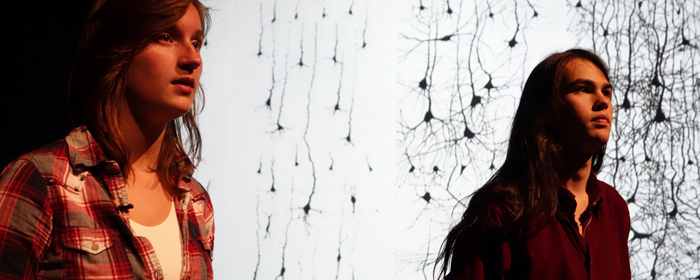 |
WOE
Wednesday's child is full of woe, Three teenagers stand among the public and address the audience directly. They want to talk about something they have no words for. They lead each spectator through memories of his or her own youth, but gradually the usual images of childhood are replaced by images connected to the experience of neglect and abuse. The youngsters navigate us through zoomed-in, subjective experiences, fantasies and dreams, alternating with scientific details about what happens in the body and the brain during physical abuse. How close can you come to the experience of another person?
From the press: They warn us. The willingness to listen to stories on this topic, implies a willingness on our part to place ourselves in the world of these abused youngsters. And this is not achieved without an effort. We are subjected to a number of playfully performed tests. About dying hearing cells. And about our alertness. Imperceptibly and gradually, we end up in (their?) abuse stories. And we, as an audience, get caught up in dreams and fantasies we would not so readily go along with in normal (non-theatrical) circumstances. Although the curtains on stage never go open, the four teenagers most certainly open a curtain in our minds. They don't perform for us but rather with us. And with our imagination. Basically no attempts are made to arouse pity. But they manage to touch in a strong way, some of our nerves which we thought were made of steel. They also recount, with mysterious smiles playing on their lips, high-imagery stories about abuse cases, which they shove aside almost immediately, labelling them as exaggerations. In the meantime, they have told us that a child that is kicked out of school with no money or house keys, simply because the building is closing, suddenly finds himself facing the world all alone. And after seeing Woe, I also know how you should, and should not, treat a black eye. Towards the end, we all end up in an auditory performance of a nightmare of the abuse itself. A horrific fever dream. At that precise moment, the teenagers hold the audience firmly in their grip, only to release them immediately after, in an almost relaxed manner. It's quite a wonderful experience actually, this Woe. Loek Zonneveld, De Groene Amsterdammer ***How do you tell an audience that you've been abused as a child? The young people, aged 16 and 17 in the performance Woe also don't know ... Director Edit Kaldor gives her relatively inexperienced performers all the space to be themselves. It all seems casually played, but Kaldor directs with great precision a performance about what abuse does with a human being. The Hungarian Kaldor, working in the Netherlands, made in the last few years furore with her performances in which mostly amateur performers expose us to unspeakable subjects. In Woe that subject is traumatic memory. ...The ominous end of the performance remains in our minds for a long time afterwards. Vincent Kouters, de Volkskrant 'Woe' touches so many issues about representation, conceptual worlds and traumas in a way that feels very authentic, simply because the story is told from the perspective and with the means of people who are young at this very moment - and therefore very close to the age at which they could have been abused. It all passes with little emphasis, but it keeps you thinking for a long time after the performance is finished. Pieter T'Jonck, Etcetera ****Kaldor makes an exciting choice for young performers, who are much closer to the age of the victim than most spectators. Their jumpy adolescent energy is contagious. You, as spectator want to go along with their proposal, even if they are asking you to revisit the nastiest of memories. It's amazing how Kobe Koopman, David de Lange, and especially Tirza Gevers carry the show. The story could be theirs, but it could as well be of one of the spectators. Moos van den Broek, Theaterkrant Woe is produced by Stichting Kata / Edit Kaldor, and is co-produced by Hebbel am Ufer, Berlin, Teatro Maria Matos, Lisbon and STUK, Leuven Supported by Dutch Performing Arts Fund, Amsterdam Arts Fund and SNS Reaal Fund |
CREDITS
Concept and direction: Edit Kaldor
Performance: Merel Ouwehand, David de Lange and Kobbe Koopman
Text: Edit Kaldor, Karmenlara Ely and the performers
Assistant dramaturgy: Camilla Eeg-Tverbakk
Light: Jan Fedinger
Text advice: Rob de Graaf
Direction assistant: Annefleur Schep
Management: Anneke Tonen
Thanks to: Nicola Unger, Frank Theys and Emke Idema